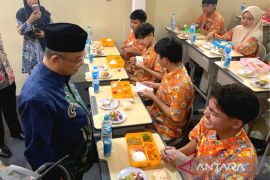Culture and Education Minister Muhadjir Effendy has said school principals had important role in strengthening the success of character education.Jakarta (ANTARA News) - Character education at school is believed to able to greatly help the learners with their academic subjects.
Teaching diligence and a sense of responsibility as some of the main core values in character education will enable the learners to learn how to focus on their studies.
With these, students will learn how to focus on their studies, and more importantly they will have the drive that will make them want to do well in their academic subjects.
In addition, building character at school will also help the learners to interact properly with their teachers and fellow students, and turn their classroom into a better learning environment.
To be effective in schools, character education must involve everyone -- school staff, parents, students, and community members -- and be part of every school day.
Hence, Culture and Education Minister Muhadjir Effendy has said school principals had important role in strengthening the success of character education.
"The principals should have a role to draw up a program of activities in strengthening the implementation of character education, and encourage teachers to become good educators who can inspire the learners," Effendi remarked in Jakarta on Saturday.
According to him, the principals should encourage the teachers to not only lecture in the classroom, but also must strive to become good motivators and educators.
The culture and education minister explained that the strengthening character education program is currently being tested in hundreds of schools in Indonesia, and therefore, he invited the principals to support this program in order to prepare the next generation with strong and good character.
Various environmentally-based extracurricular activities outside the classroom will make character education in schools interesting and exciting.
"Activities such as role play and collaborate to complete a project will be very exciting for the students," Effendi said, adding that instilling good character among the young generation from an early age will continue to rub off on them and determine their success in the future.
According to him, a good character has a high durability and will determine the success to achieve what the young generation aspire.
Character education includes and complements a broad range of educational approaches such as whole child education, service learning, social-emotional learning, and civic education.
All share a commitment to helping young people become responsible, caring, and contributing citizens.
Because students spend so much time in school, the schools offer a critically important opportunity to ensure that all students get the support and help they need to reach their full potential.
Schools that embrace character education become places people want to be because they bring out the best in everyone.
Therefore, the Indonesian Ministry of Culture and Education has set itself a target to implement character education in 9,830 schools in 34 provinces in 2017, and in all the schools across the country by 2020.
Character education is a teaching method which fosters the development of ethical and responsible individuals by teaching them about the good values that people should have.
It teaches the students the values of caring about other people, honesty, responsibility, and other important traits that make for an upstanding citizen.
The reason for teaching good character is to help prepare the students to face the many opportunities and unknown dangers that are in todays society.
Character education gives the students the knowledge they need to know what these dangers in society are and deal with them properly.
Young people these days gets exposed to literally thousands of negative influences through the media and their peers every day, add to this the sad fact that parents are spending less time with their children.
Parents want nothing more than for their children to grow up into well-mannered individuals and give the proper respect to other people. Which is why character education is an important part in their studies, because success in life does not always rely on academics.
In the light of all these, character education should start at home where children can learn through positive examples and encouragement from their parents.
Although character education is imparted in schools, it is not always merely the education that parents want their children to receive since if virtues are not reinforced and modeled at home, they will not exhibit good character or positive virtues.
Children who fail to receive character education at home will lack basic virtues that can lead to moral dilemmas in society.
Therefore, parents have to realize that character education, which encompasses honesty, trustworthiness, respect, responsibility, fairness, caring for others, and even citizenship, should begin at home as teachers cannot do it all alone.
Honesty and trustworthiness are the foundation on which character is built at home, but parents are often confronted with children who are not trustworthy.
From an early age, one is challenged to be a good citizen on a daily basis.
Within the family, children learn to work together and bond with each other as a single unit to address issues in their community and make a difference.
Hence, the National Commission for Child Protection Chairman Arist Merdeka Sirait has stated that the values of mental revolution can be imparted by the family, which serves as the primary vehicle for the young generation in shaping the character of the nation.
"It is my hope that mental revolution will start within families that can play their part by instilling religious, social, and cultural values in order to shape the mentality, character, and behavior of children," Sirait remarked some time ago.
According to him, character education in the family needs to be prioritized in order to create a golden generation that does not demonstrate negative behavior.(*)
Reporter: Otniel Tamindael
Editor: Heru Purwanto
Copyright © ANTARA 2017











